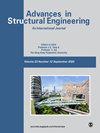Experimental and numerical study of the three-dimensional temperature field in the arch ribs of the reinforced concrete ribbed arch bridge during construction
IF 2.6
4区 工程技术
Q2 CONSTRUCTION & BUILDING TECHNOLOGY
引用次数: 0
Abstract
The unique structural design of an arch ring featuring varying inclination angles for individual segments causes variations in the longitudinal distribution of the temperature field d along the arch axis. This study aims to enhance the understanding of temperature fields in reinforced concrete (RC) arch bridges with diverse arch ring structural configurations during their construction phases. A comprehensive investigation into the three-dimensional distribution pattern of solar-induced temperature fields within arch ribs during the construction of RC ribbed arch bridges was conducted. A field test specifically measuring the temperature distribution across arch rib cross-sections was conducted on-site, involving an RC arch bridge constructed using the cable-stayed cantilever cast in situ method. Analyzing the monitored on-site temperature data revealed the distribution characteristics of temperature fields at the arch foot cross-section under solar radiation. By comparing these findings with international standards, a vertical temperature gradient fitting model for arch rib cross-sections under solar radiation was formulated. Drawing upon meteorological records and solar radiation principles, an adaptive numerical simulation finite element model was developed to depict the temperature field within an arch rib section. This model was rigorously verified. Subsequently, a comprehensive analysis of the three-dimensional temperature field of the arch rib under solar radiation was performed. Additionally, a three-dimensional temperature gradient fitting model was proposed, accounting for the longitudinal inclination of the bridge.施工过程中钢筋混凝土肋拱桥拱肋三维温度场的实验和数值研究
拱圈结构设计独特,各段倾角不同,导致温度场 d 沿着拱轴线的纵向分布发生变化。本研究旨在加深对具有不同拱圈结构配置的钢筋混凝土(RC)拱桥在施工阶段的温度场的理解。在 RC 肋拱桥施工过程中,对拱肋内太阳诱导温度场的三维分布模式进行了全面调查。现场测试专门测量拱肋横截面的温度分布,涉及一座采用斜拉悬臂现浇法建造的 RC 拱桥。通过分析监测到的现场温度数据,揭示了太阳辐射下拱脚横截面温度场的分布特征。通过将这些结果与国际标准进行比较,建立了太阳辐射下拱肋横截面垂直温度梯度拟合模型。根据气象记录和太阳辐射原理,建立了一个自适应数值模拟有限元模型,以描述拱肋截面内的温度场。该模型经过了严格验证。随后,对太阳辐射下拱肋的三维温度场进行了综合分析。此外,还提出了一个三维温度梯度拟合模型,考虑到了桥梁的纵向倾斜度。
本文章由计算机程序翻译,如有差异,请以英文原文为准。
求助全文
约1分钟内获得全文
求助全文
来源期刊

Advances in Structural Engineering
工程技术-工程:土木
CiteScore
5.00
自引率
11.50%
发文量
230
审稿时长
2.3 months
期刊介绍:
Advances in Structural Engineering was established in 1997 and has become one of the major peer-reviewed journals in the field of structural engineering. To better fulfil the mission of the journal, we have recently decided to launch two new features for the journal: (a) invited review papers providing an in-depth exposition of a topic of significant current interest; (b) short papers reporting truly new technologies in structural engineering.
 求助内容:
求助内容: 应助结果提醒方式:
应助结果提醒方式:


